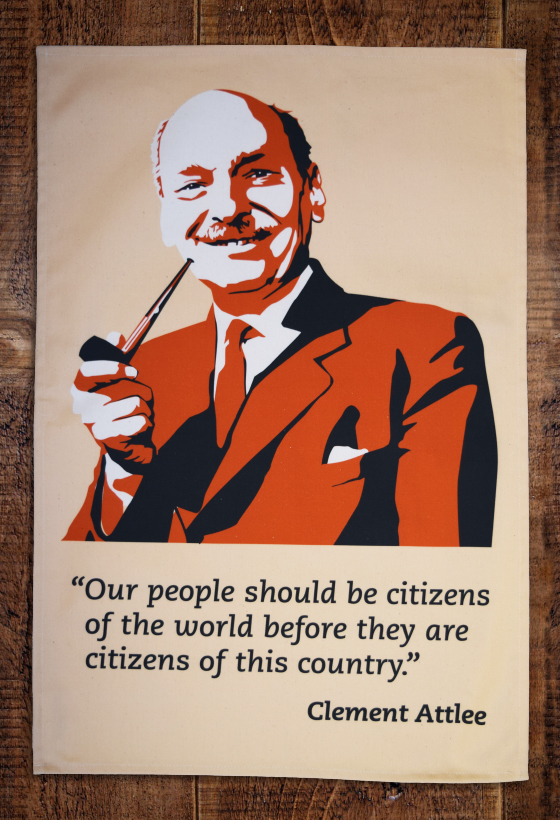An Exercise in Self-Criticism: The Anatomy of a Radical Tea Towel and the Hazards of Representing the Past
Posted by Pete on 8th Feb 2019
A face, a quotation, and a name.
Most of the time, excluding the material aspect (half panama, natural unbleached cotton, if you were wondering), this trinity is what makes up a ‘Radical Tea Towel’.
Take Che Guevara – we show the classic pose, beret-clad and looking to the horizon, beneath which are his stirring words: “If you tremble with indignation at every injustice, then you are a comrade of mine.”
Or Christina Rossetti – the 19th century poet, etched in red onto a white background, looks calmly off to her right, above the sure, feministic maxim: “For there is no friend like a sister in calm or stormy weather.”
These two Radical Tea Towels and all the others unmentioned here are representations, right?
But how accurate are they as representations? It’s a bloody interesting question.
Its answer, simply put, depends on what it means to accurately represent someone.
If it’s a matter of whether the person whose face is on our tea towel said or wrote the quotation we’ve put next to that face, then it’s almost always an accurate representation. Karl Marx, for example, simply did write (with his pal, Friedrich Engels) “Workers of the world, unite! You have nothing to lose but your chains” in The Communist Manifesto (1848).
But what if we were to say an accurate representation means something ‘deeper’ than this? Say, the quotation we’ve attached has to ‘embody who the person was’. That’s a fair bit more complicated...
For example, in the values they expressed throughout their lives, was the character on our tea towel always consistent with the quotation we’ve chosen for them?
Consider our Clement Attlee tea towel. On it, we have Labour’s post-war Prime Minister declare “our people should be citizens of the world before they are citizens of this country” (a quote from his 1937 book, The Labour Party in Perspective).

There is no doubt this is a bold statement in support of internationalist values against national chauvinism.
But there’s also no doubt that, throughout his political life, Attlee frequently expressed support for the British Empire – an intrinsically selfish machine fuelled and enabled by Britons acting in their own interest to the detriment of others - as ‘citizens of their country’, not as citizens of the world.
Does this throw our representation of Clement Attlee into jeopardy? By tying him to a single quotation for cosmopolitanism which he frequently contradicted, are we creating an inaccurate image?
And what about the question of deeds and words? George Washington speaks loftily on our tea towel of how, “If the freedom of speech is taken away then dumb and silent we may be led, like sheep to the slaughter.” But his actions often transgressed these liberal expressions.
What of, for example, the freedom of speech of the black slaves at his Mount Vernon plantation who spoke out against their overseers? Or the freedom of speech of Sergeants David Gilmore and John Tuttle of the Pennsylvania Line who, on Washington’s authority, were executed at Pompton for protesting the non-payment and poor conditions suffered by their men?
Might George Washington not be better represented by the testimonies of those he enslaved, or the death certificates of his mistreated soldiers, than by this picked quotation in favour of tolerance and freedom?
At the end of the day, few of our tea towel designs fully meet these deeper versions of ‘accurate representation’. Some measure up better than others but, ultimately, political lives are usually just too complicated and inconsistent to be captured with articles and books, let alone a tea towel with space for just a face, a single quotation, and a name.
If historical representation is a science (and I doubt it is), then it’s a deeply imperfect one. We try to do our best, but it’s difficult to expect concise, artisan tea towels to overcome theoretical challenges of historical practice which continue to stump the most sophisticated thinkers in history faculties around the world!
However, while the challenge of accuracy always leaves them on shaky ground, accuracy is not the only cause our radical tea towels are trying to serve.
All of us at Radical Tea Towel, in our own particular and varied ways, are progressives – happy members of what 19 th century observers used to call, with a broad brush, the ‘Party of Movement’. As such, with our products, we are trying to make a positive, Leftward change in the world, not just a successful small business.
To this end, our tea towels are designed not simply to reconstruct the past, but to promote values and encourage the discussions which can deepen and develop them as well.
So, from this angle, when we show an image of Arthur Miller above the quotation “Don’t be seduced into thinking that that which does not make a profit is without value,” the most important thing isn’t actually whether this anti-materialist sentiment was always, or even usually, held to by the historical man called Arthur Miller.
The most important thing here is whether this tea towel is something which can be used to promote and spread the radical idea that people, happiness, and other such things might be valued more than money – and I’d say it definitely is.
So long as we’re doing a good job of getting these ideas across to our readers and into your conversations, while doing our best to be accurate with events and figures, I can live with continuing to stumble at some of the hurdles of historical reconstruction.
